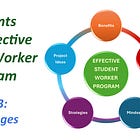Elements of an Effective Student Worker Program - Part 1: Introduction
…keeping the commitment…
PREFACE
The topic of student employment is one that is very close to my heart. I started out as a work-study student during my undergraduate years, then went on as a graduate assistant, and from there I started my first “real job” of my career at the Indiana University - Department of Environmental Health and Safety in Bloomington, IN…where I had spent the previous 4.5 years as one of their student workers. I was very fortunate with the level of support, training, and encouragement that I received, not just from my immediate supervisor and their manager, but also from the entire department as a whole. The staff in the department welcomed me and treated me like a member of the staff. As I continued expanding my knowledge, training, and experience…projects and new assignments kept coming my way. I had such a positive and rewarding experience as a student worker that I made a personal commitment to myself once I started my professional career. I committed that I would try to both hire student workers whenever possible, and to encourage other supervisors to hire student workers as well. I also committed to mentoring both students and supervisors of students…and try to do my part and provide the same positive and rewarding experience to student workers that I was so fortunate enough to have received during my time as a student worker.
Fast forward a few decades of hiring, supervising, and mentoring numerous student workers. After many years of lessons learned and reflection on this topic, I present the elements below for an effective student worker program. I tried incorporating lessons learned from both the operational and administrative side of having student workers, as well as offering strategies for developing the processes and procedures to ensure both consistency and continuous improvement. Over the years I found that having such an organized process both attracted and retained the high-quality student workers that I was looking to hire and keep them gainfully employed until they graduated. Because my background is in environmental health and safety, specifically research safety, I'll use examples from that career field. However, the elements and strategies discussed in this series of articles can be applied to any career field that you choose to hire a student worker.
Introduction
With students back on campus and classes starting back up again…another new semester ritual will also commence…students looking for jobs. For some, their first job attending college may in fact be…their first job. Perhaps it may even be their first “real job” working in an office setting and, if they have an awesome supervisor, maybe they’ll even have their own desk and cubicle! The smart (and lucky) students will have secured employment well before the summer or already had information from a friend about an upcoming job opening…likely in the same department where their friend works. For the rest of these job hungry students…. the mad scramble to find gainful employment on campus begins….until all campus jobs are filled. Here lies the opportunity for savvy supervisors and directors looking to enhance their existing programs and expand their level of customer service to the campus community….by hiring a student worker!
At the basic level, it's all about supply and demand for these coveted student jobs. It presents an excellent opportunity for supervisors to hire smart, technically competent, enthusiastic, and energetic student workers. Student workers who are full of ideas and on a quest for learning, while seeking work experience to start their professional careers. At the highest level, a strong argument can be made that the hiring of student workers by campus departments absolutely supports the overall institutional mission and purpose of colleges and universities. The following observations can be made to support this argument using the following three general categories of teaching, research, and service.
Teaching - Many colleges and universities have internships, co-op programs, and work experience requirements as part of their academic programs. This is based on the simple fact that academic training combined with hands-on technical training and work experience…provides the most beneficial experience for a student worker beginning their professional career. The knowledge and experience a student worker will gain while working towards their college degree, will provide invaluable real-world teaching and training. Those colleges and universities that have work experience requirements as part of their academic programs, and those institutions which support hiring large numbers of student workers, in both academic and non-academic positions, should be commended for their wisdom.
Research - Hiring student workers supports the research of colleges and universities in many ways. Besides the direct support of hiring student workers as researchers, there is also a very large support structure within the colleges and universities that support the research enterprise. This type of support comes from various departments such as campus security, environmental health and safety, health services, information technology, physical facilities, and many others. Many of these departments regularly rely on student workers to carry out specific responsibilities to support research.
In addition to the direct support of research, there is indirect support by student workers as well through their interactions with researchers in carrying out their job responsibilities. Student workers can also use their work projects to fulfill some project requirements in their classes, which could lead to conference papers and presentations, and additional research project ideas.
Service - Providing employment opportunities to the student population provides multiple benefits towards providing service to both internal and external stakeholders to the institution. Besides the obvious service of offering energetic and talented students to campus departments needing to fill jobs, other benefits include allowing for better provision of campus services. This in turn can lead to higher levels of customer service and satisfaction, as well as higher engagement and ownership of the student worker population into the internal operations and support structure of the college and university.
This service mission is further enhanced when these student workers graduate and then go on to become successful professionals in their own fields. These successful professionals could end up working in the private and public sectors and non-profits organizations and carrying forward the valuable lessons they learned in their classes and as part of their student work experience. After those student workers graduate, they can look back fondly on their alma mater and reflect on the rewarding work experience and academic training they received in as a student worker.
An effective student worker program can take time and effort to develop, however, the rewards for the supervisor, the student worker, and the institution are substantial and well worth the efforts. Developing an effective student worker program includes consideration of the following elements:
Benefits
Challenges
Mindset
Strategies
Project Ideas
While many of the elements should seem to be common sense when hiring and supervising student workers, unfortunately, based on conversations with many student workers, these concepts are not universally practiced. The information presented in this series of articles is a compilation of lessons learned and observations over the years from a person who has supervised and mentored many student employees….and from the perspective of a person who started out their professional career as a student worker.
This series of articles on the Elements of an Effective Student Worker Program is meant to serve as a “communications bridge” between the supervisor and student worker in an effort to facilitate the development of an effective student worker program. An effective student worker program will provide a positive and rewarding work experience, and opportunities for personal and professional growth, as well as many other benefits, for both the supervisor and the student worker.
Related article:
















